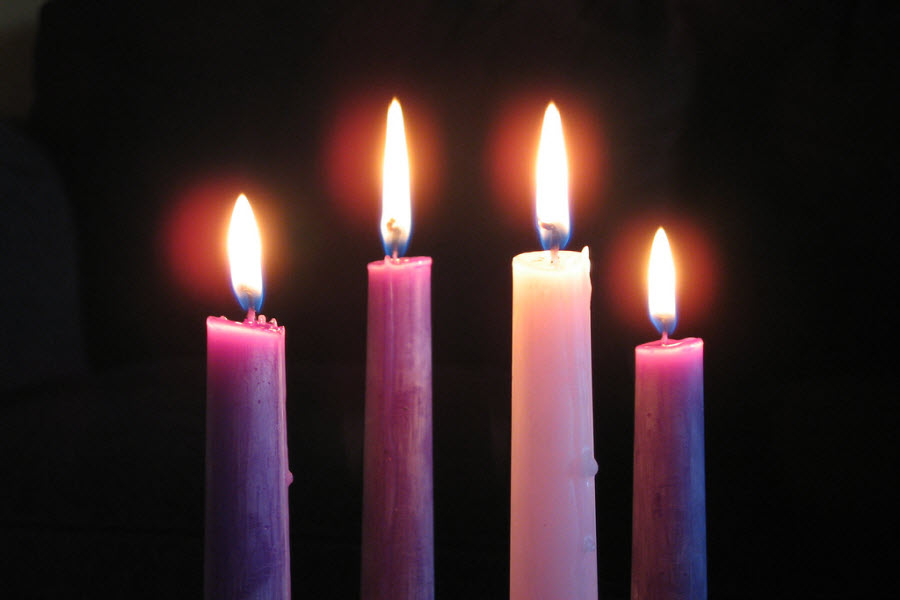
What is Advent?
11-27-2016Pastor's LetterFr. Don Kline, V.F.Dear Brothers and Sisters in Christ,
The word Advent means coming, and the season prepares us to celebrate the coming of Our Blessed Savior. Advent is the beginning of a new liturgical year for the Roman Catholic Church. On the first day of Advent, which begins this year on November 27, the Church celebrates its New Year's Day. The date for the beginning of Advent falls each year on the Sunday closest to November 30th - the feast day of Saint Andrew the Apostle.
Sometimes people make the mistake of thinking that Advent is part of the Christmas celebration. In fact, Advent is a separate time of preparation all its own. For the Catholic Church, Christmas doesn't begin until the first Mass is celebrated on Christmas Eve and it continues until the "Octave of the Epiphany" which occurs on January 13.
Advent is given to us as a time to prepare our souls for the coming of the Lord. This season is very similar to Lent, which helps us to prepare for Easter. In modern times we are tempted to skip over the penitential aspects of Advent and focus on the joy of Christmas. This is a great tragedy. A faithful Catholic would not skip Lent and focus on Easter. Nor would a faithful Catholic skip Advent to focus just on Christmas. Looking for only the joy denies the truth: the Christ Child is our Lord and Savior Who will suffer and die for our salvation.
Originally, Advent was celebrated over forty days, just like the Lenten season. This has now been shortened to four weeks, but the symbolism remains. You may notice another similarity to Lent when you attend Mass; although we still sing the Alleluia before the Gospel reading, we no longer sing the song of the angels - the Gloria. We will sing this song of the angels with the angels on Christmas day - just as they did over 2000 years ago.
The Scripture readings during Mass remind us of all the prophecies that point to the Lord's coming. We are called to keep watch and to leave behind our sinful ways. We also hear the reoccurring theme of a light shining through darkness. In Isaiah 60:19 we are reminded of this promise: "The sun shall be no more your light by day, nor for brightness shall the moon give light to you by night; but the LORD will be your everlasting light, and your God will be your glory."
God bless,
Fr. Kline, V.F. Pastor
El que es el Adviento?
Queridos Hermanos y Hermanas en Cristo,
La palabra Adviento significa venida, y este tiempo nos prepara para celebrar la venida de Nuestro Santo Salvador. El Adviento es el comienzo de un nuevo año litúrgico de la Iglesia Católica Romana. En el primer Domingo de Adviento, el cual comienza el 27 de Noviembre, la Iglesia celebra el Día de Año Nuevo. La fecha para el comienzo del Adviento comienza cada año con el Domingo que este más cercano al 30 de Noviembre—la Fiesta del Apóstol San Andres.
A veces las personas cometen el error de pensar que el Adviento es parte de la celebración de la Navidad. De hecho, el Adviento es un tiempo a parte, es un tiempo de preparación. Para la Iglesia Católica la Navidad no comienza hasta la primera Misa celebrada en Noche Buena, y continua hasta “la Octava de la Epifanía” la cual ocurre el 13 de Enero.
El Adviento se nos ha dado como un tiempo para que nuestras almas se preparen para la venida del Señor. Esta época es bastante similar a la Cuaresma, la cual nos ayuda a preparar para al Resurrección. En estos tiempos modernos somos tentados saltarnos este tiempo penitencial del Adviento y a concentrarnos solo en la alegría de la Navidad. El buscar solo la alegría en como negar la verdad: El Nino Jesús nuestro Señor y Salvador Que sufrirá y morirá por nuestra salvación.
Originalmente el Adviento era celebrado por cuarenta días, igual que la época de la Cuaresma. Este tiempo ha sido acortado ha cuatro semanas, pero el simbolismo continua. También se darán cuenta de otra semejanza cuando vengan a Misa; aunque seguiremos cantando Aleluya antes del Evangelio, no cantaremos la canción de los ángeles—EL Gloria. Cantaremos la Gloria con los ángeles el día de la Navidad—tal como los ángeles lo cantaron hace 2000 años atrás.
Las lecturas de la Escrituras durante la Misa nos recuerdan de todas las profecías que señalan a la venida de Nuestro Señor. Todos estamos llamados a hacer vigilia y dejar atrás nuestra vida de pecado. También escucharemos el tema continuo de la Luz que alumbra en la oscuridad. En Isaías 60:19 se nos recuerda esta promesa: “ya no tendrás necesidad del sol para que alumbre tu día, ni de la luna para la noche. Porque Yave será tu luz eterna, y tu Dios tu resplandor”.
Dios bendiga,
P. Don Kline, V.F.
Pastor